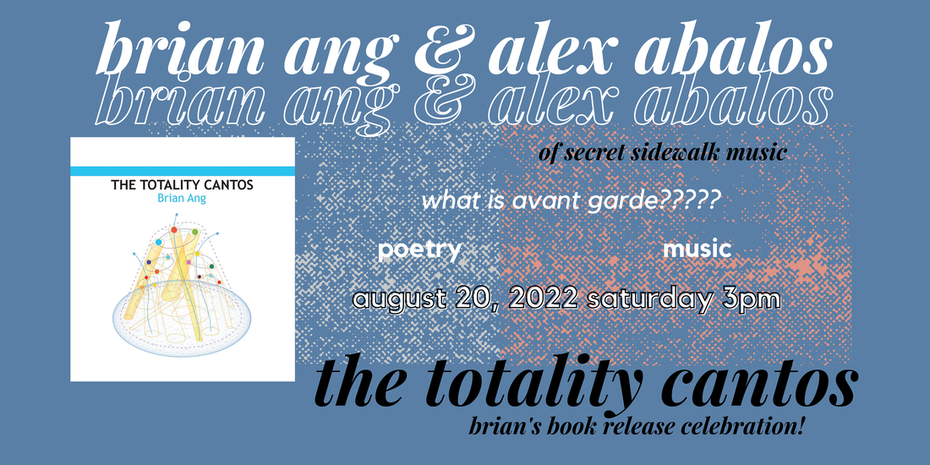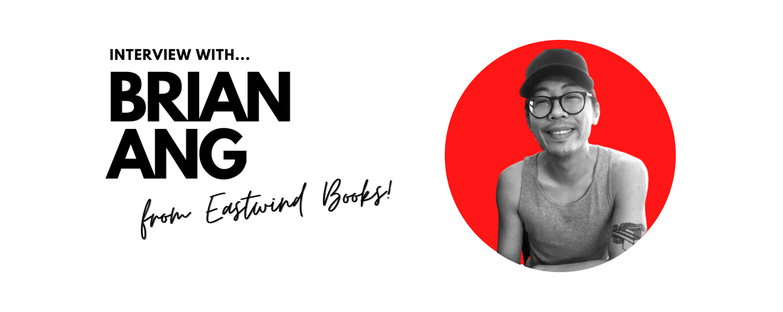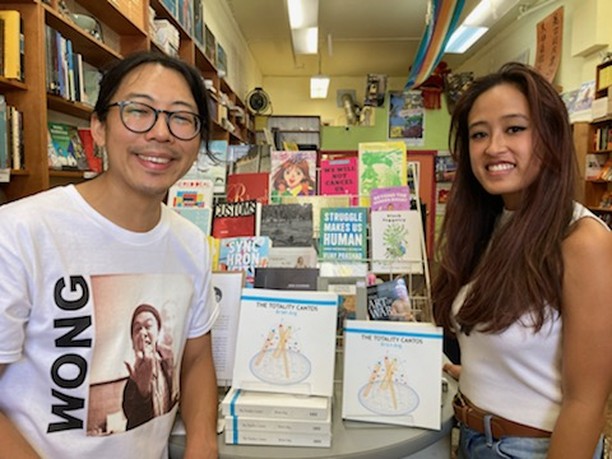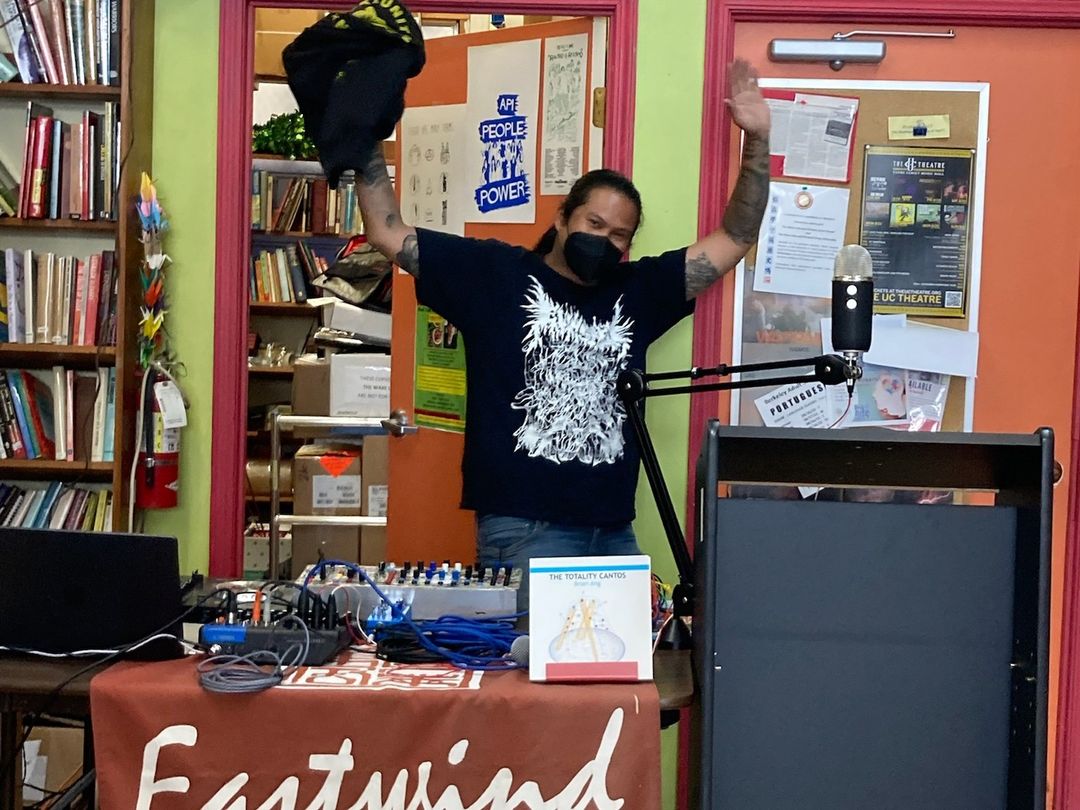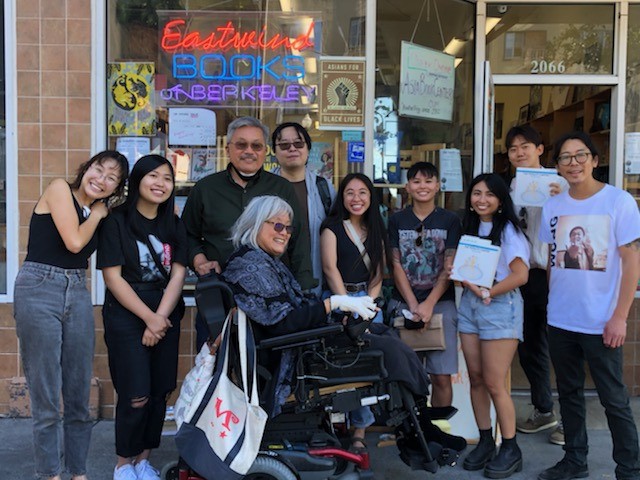The Totality Cantos: Brian Ang and Alex Abalos on the Avant-Garde
Eastwind Books of Berkeley, August 20, 2022
Interview with Cheryl Truong for Eastwind Books of Berkeley
Livestream recording:
Alex Abalos: DJing: 3:22
Cheryl Truong: Introduction: 13:30
Alex Abalos: Performance: 18:10
Travis Ortiz: Lyn Hejinian on Publishing The Totality Cantos: 23:58
Brian Ang: 30:00
The Totality Cantos’ description: 31:00
TOTALITY CANTO 59: 31:50
From The Totality Cantos: 61-7 + 39-8 + 78-7 + 89-8 + 93-3: 40:12
From A Thousand Records: 96-100: 44:47
Discussion: 49:02
How long have you worked at Eastwind?: 49:58
Choosing words and radio experience: 50:20
How did you come to read The Totality Cantos the way you do?: 54:29
Formal rules of The Totality Cantos: 55:46
The Totality Cantos’ title: 59:10
Avant-garde music and street culture: 1:03:16
Sampling and the avant-garde: 1:06:43
The avant-garde and new weapons: 1:15:15
The Totality Cantos’ visual art: 1:22:13
Alex Abalos: DJing: 1:25:22
Lyn Hejinian on Publishing The Totality Cantos
I want to start by thanking Eastwind Books for so generously hosting this event, which celebrates The Totality Cantos, Brian Ang’s first major literary publication—and it is, indeed, major: a masterwork, I would say.
And having said that, I want to thank Brian himself for trusting Atelos with a manuscript that took him almost a decade to compose.
Its structure is complex, reflecting motivations amply explained in the generous “Preface” (titled “Totality and Method”) that he has contributed to the book but exceeding those motivations by virtue of the obliterative force of totality itself—its incessant proclivity for rearray, display, and annihilation—totality to the max—the totalization of totality.
Happily for us, Brian Ang’s The Totality Cantos—which, after all, is a work of magnificent literary art rather than a political state—has not achieved annihilation. It is recalcitrant, frontal, and lippy.
Let me read the sequence of ten 2-word lines from each of the ten sections of “Totality Canto 26”:
Revolution value
Diplomatic decorum
Land preoccupation
Advance dissemination
Depressed anomie
Careful massacre
Ancient west
Colonial writers
Restoration constraints
Formal threat
(The Totality Cantos 90-92)
What then is the poem about?
I would venture that totality seizes and consumes aboutness even as it produces and purveys it. Probably—if I weren’t so intimidated by Brian’s achievement in this work—I’d equate totality with capitalism. But that would be saying more about me and my political despair than about The Totality Cantos and the playfulness with which Brian approaches the formidable defenses of totality. What Brian has said is, “I wrote the poem from the desire to be interested in everything” (9).
What, we might ask, could have motivated that interest and sustained it for so long? Surely it wasn’t—isn’t—sheer intellectual curiosity. I would propose that The Totality Cantos is a prolonged and indefatigable act of rebellion, carried out in the sphere of aesthetics (insofar as we limit ourselves to calling the work a poem) and, despite the foregrounding of the work’s formal structure, informed by ideas closer to anarchism than to, say, revolution, which virtually always culminates in the formation of a powerful and usually autocratic state.
Something brief needs to be said about the intricate form that provides The Totality Cantos with what appears to be an unassailable structural autonomy. In fact, that autonomy—hardcore, radical, and defended by such contemporary discourse worlds as economics, religion, philosophy, mathematics, history, politics, humanities, and so forth—is (or can be) mutable and, perhaps, damageable. The last sentence of Brian’s “Preface” states, “totalitycantos.net includes the complete, searchable text in order to find words of interest and a generator”—this is the important part—“and a generator that randomizes assemblages of its one thousand sections” (11).
This addition to possibilities for reading and experiencing The Totality Cantos is not gratuitous. As Brian argues: “Writing is constructive articulation, articulating lines and assembling sections in order to subjectivate sense against totality’s limiting of it, thinking extendable in all directions” (11).
Access to the online, downloadable, free version of the poem does not contravene the significance of the published Atelos version of the work. It exerts a strong impression, and in many ways a playful as well as intimidating one. The cover and text were designed and typeset with patience and sensitivity by the inestimable Derek Fenner, always with an eye and ear to Brian’s emendations and requests. And the exquisite front and back cover images were created by Marc Ngui in conversation with Brian Ang and specifically for the book. My co-editor Travis Ortiz and I most gratefully acknowledge the large role they played in the production of the Atelos version of the work.
As Brian once wrote in an essay he contributed to the third issue of his magazine ARMED CELL, “The stakes continue to be the constitution of the world.”1
1 Brian Ang, “Language Writing and the Present,” ARMED CELL 3 (June 2012).
|
